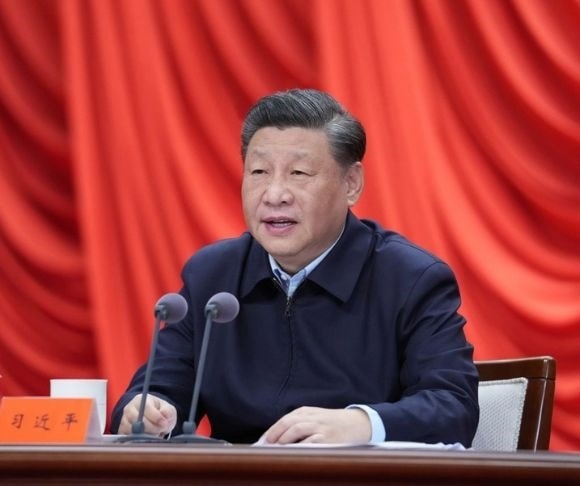
Xi Jinping (Photo by Shen Hong/Xinhua via Getty Images)
Continuing its regional war-like tantrum over House Speaker Nancy Pelosi’s visit to Taiwan, Beijing announced it is done communicating with the Biden administration on climate change, drug enforcement, and other topics. To date those dialogues have accomplished little if anything. Instead, China is building coal-fired power plants at record rates. Deadly drugs originating in that nation are flowing through President Joe Biden’s porous border more than ever. So if China halts talks, who will notice?
 The People’s Republic of China (PRC) suspended “cooperation on transnational crimes or repatriating illegal immigrants,” The Washington Times wrote, and “Chinese officials said talks between regional commanders and military maritime consultations would be canceled.” Up to this point, military talks have proved ineffective in dissuading the Chinese Communist Party (CCP) from its bellicose behavior in the South China Sea. Historically, Beijing scores much more in terms of propaganda value for messaging to its Third World audiences than Washington achieves in resolving matters between the two armed forces.
The People’s Republic of China (PRC) suspended “cooperation on transnational crimes or repatriating illegal immigrants,” The Washington Times wrote, and “Chinese officials said talks between regional commanders and military maritime consultations would be canceled.” Up to this point, military talks have proved ineffective in dissuading the Chinese Communist Party (CCP) from its bellicose behavior in the South China Sea. Historically, Beijing scores much more in terms of propaganda value for messaging to its Third World audiences than Washington achieves in resolving matters between the two armed forces.
The widely reported phone calls between President Joe Biden and his Far East counterpart Xi Jinping so far have produced nothing of value for the United States. All the recent live-fire exercises near Taiwan simply cowed Secretary of Defense Lloyd Austin into once again holding in abeyance a scheduled test of a US intercontinental ballistic missile (ICBM).
China Halts Talks, US Halts ICBM Test

John Kirby (Photo by Win McNamee/Getty Images)
“As China engages in destabilizing military exercises around Taiwan, the United States is demonstrating, instead, the behavior of a responsible nuclear power by reducing the risks of miscalculation,” John Kirby, the new National Security Council strategic communications chief, justified to reporters after Austin’s backdown. This approach to the PRC’s aggressive behavior projects not an image of strength but of fear. It demonstrates that, when confronted, the Biden administration reacts with trepidation.
And it’s not the first time. “The US military has canceled a test of its Minuteman III intercontinental ballistic missile that it had initially aimed only to delay in a bid to lower nuclear tensions with Russia during the war in Ukraine,” Reuters observed back in April. Of course, not purposefully increasing hostilities in a nuclear age is responsible. But there should be some expectation of reciprocity. At the time, Austin said he hoped that Moscow would respond by “taking the temperature down” in the Kremlin’s invasion of Ukraine. Did Russia recognize the US actions as conciliatory and behave in kind? Of course not.
Canceling ICBM Test Will Not Prompt Like Gesture From China

Xi Jinping (Photo by Shen Hong/Xinhua via Getty Images)
Nor will canceling this ICBM test launch persuade the CCP to tone down aggression over Taiwan. Instead, the People’s Liberation Army (PLA) naval, air, and ground forces have intensified war-preparation exercises. “The [PLA] Rocket Force also fired projectiles over Taiwan into the Pacific, military officers told state media, in a major ratcheting up of China’s threats to attack and invade the island … bombers, destroyers, and frigates were all used in what it called ‘joint blockage operations,’” Armed Forces Connect reported. The US gesture of postponing a much-needed strategic ICBM tryout was wasted.
Xi and the CCP know full well the Biden administration has not backed away from the One China diplomatic policy, making the behavior of the Chinese government nothing more than an exercise in thumbing its nose at another superpower. It may be time to revisit the “strategic ambiguity” surrounding the China-Taiwan situation. Leaving the option of coming to Taiwan’s defense vague and unclear serves neither the interests of the United States nor the region.
The views expressed are those of the author and not of any other affiliation.
Remember to check out the web’s best conservative news aggregator
Whatfinger.com — the #1 Alternative to the Drudge


